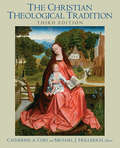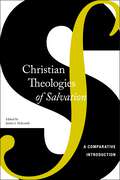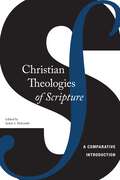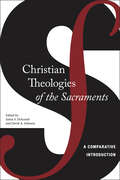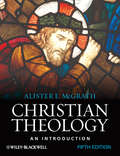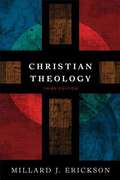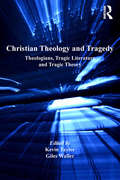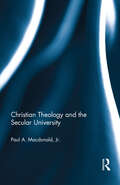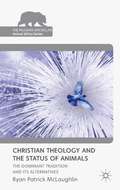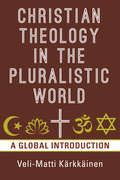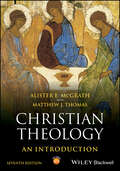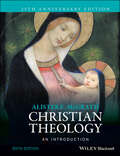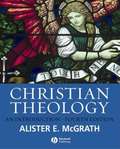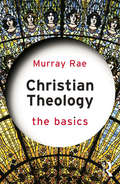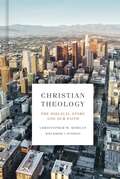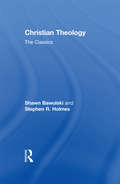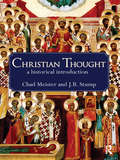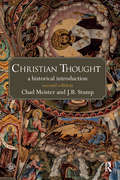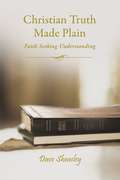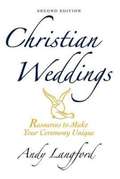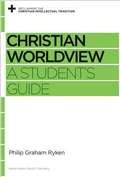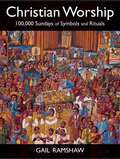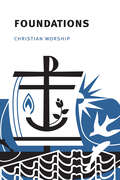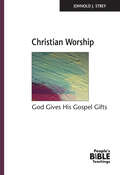- Table View
- List View
Christian Theological Tradition
by Catherine Cory Michael HollerichThis text helps students acquire a basic theological literacy in key persons and events of the Bible and the Christian faith, and in Christianity's encounter with culture at large. Historically arranged, it also addresses five major themes of systematic theology: revelation, God, creation, Jesus, and church.
Christian Theologies of Salvation: A Comparative Introduction
by Justin S HolcombEssays exploring pivotal spiritual figures over two millennia and their doctrines of salvation. Salvation has been a key focus of Christian theology since the first days of the church. Theologians from St. Augustine to Karl Barth have debated the finer points of salvation for nearly as long, offering a bewildering array of competing and often contradictory theories. Christian Theologies of Salvation traces doctrines of salvation from the first century into the twenty-first century. Each chapter focuses on a different major theologian, first presenting the theologian&’s doctrine of salvation, then highlighting how the doctrine makes a distinct contribution to the church&’s overall dogma. The volume offers a comparative focus, including doctrines of salvation that reflect the historical development of Catholic, Orthodox, and Protestant views. By illuminating the ways in which doctrines of salvation have evolved over the church&’s history, Justin Holcomb takes us across the teachings of Origen and Augustine, John Calvin and Martin Luther, and eventually to the more modern theologies of Karl Barth and Gustavo Gutiérrez. A much-needed map to the options and implications of different theologies of salvation, this book is essential reading for students and scholars of Christian thought. &“Holcomb has assembled a fine group of scholars to look at four major periods, patristic, Middle Ages, Reformation and Catholic Counter-Reformation, and the 18th to 21st centuries . . . [A] solid study of important voices on Christian salvation.&” ―Choice &“An important tool in helping theological students and pastors explore their own theological tradition while at the same time prompting deeper conversations with ecumenical partners.&” —Paul Galbreath, Union Presbyterian Seminary
Christian Theologies of Scripture: A Comparative Introduction
by Justin S. HolcombAll religious traditions that ground themselves in texts must grapple with certain questions concerning the texts' authority. Yet there has been much debate within Christianity concerning the nature of scripture and how it should be understood—a debate that has gone on for centuries.Christian Theologies of Scripture traces what the theological giants have said about scripture from the early days of Christianity until today. It incorporates diverse discussions about the nature of scripture, its authority, and its interpretation, providing a guide to the variety of views about the Bible throughout the Christian tradition.Preeminent scholars including Michael S. Horton, Graham Ward, and Pamela Bright offer chapters on major figures in the pre-modern, reformation, and early modern eras, from Origen and Aquinas to Luther and Calvin to Barth and Balthasar. They illuminate each thinker's understanding of the Christian scriptures and their views on interpreting the Bible. The book also includes overview chapters to orient readers to the key questions regarding scripture in each era, as well as chapters on scripture and feminism, scripture in the African American Christian tradition, and scripture and postmodernism.This volume will be indispensable reading for students and all those interested in the nature and authority of Christian scripture.
Christian Theologies of the Sacraments: A Comparative Introduction
by Justin S. Holcomb David A. JohnsonDelves into the ancient debate regarding the nature and purpose of the seven sacraments What are the sacraments? For centuries, this question has elicited a lively discussion and among theologians, and a variety of answers that do anything but outline a unified belief concerning these fundamental ritual structures. In this extremely cohesive and well-crafted volume, a group of renowned scholars map the theologies of sacraments offered by key Christian figures from the Early Church through the twenty-first century. Together, they provide a guide to the variety of views about sacraments found throughout Christianity, showcasing the variety of approaches to understanding the sacraments across the Catholic, Protestant, and Orthodox faith traditions. Chapters explore the theologies of thinkers from Basil to Aquinas, Martin Luther to Gustavo Gutiérrez. Rather than attempting to distill their voices into a single view, the book addresses many of the questions that theologians have tackled over the two thousand year history of Christianity. In doing so, it paves the way for developing theologies of sacraments for present and future contexts. The text places each theology of the sacraments into its proper sociohistorical context, illuminating how the church has used the sacraments to define itself and its congregations over time. The definitive resource on theologies of the sacraments, this volume is a must-read for students, theologians, and spiritually interested readers alike.
Christian Theology
by Alister E. McgrathAlister McGrath's Christian Theology: An Introduction is one of the most internationally-acclaimed and popular Christian theology textbooks in use today. This 5th edition has been completely revised, and now features new and extended material, numerous additional illustrations, and companion resources, ensuring it retains its reputation as the ideal introduction to Christian theology.Fully updated 5th edition of the bestselling textbook, incorporating expanded material, numerous student features and new illustrations Features new sections on Copernicanism and Darwinism Includes extended discussions of Augustine's doctrine of creation, Trinitarian theologies of religion, and the relation of Christianity to other faiths May be used as a stand-alone volume, or alongside the Christian Theology Reader, 4th edition for a complete overview of the subject Retains the chapter structure of the 4th edition, ensuring comparability with earlier editions and courses based on these Accompanied by a revised instructor's website featuring expanded resources including study questions and answers; visit www.wiley.com/go/mcgrath for more details and to register for access
Christian Theology
by Millard J. EricksonLeading evangelical scholar Millard Erickson offers a new edition of his bestselling textbook, now substantially updated and revised throughout. This edition takes into account feedback from professors and students and reflects current theological conversations, with added material on the atonement, justification, and divine foreknowledge. Erickson's comprehensive introduction is biblical, contemporary, moderate, and fair to various positions, and it applies doctrine to Christian life and ministry.
Christian Theology and Tragedy: Theologians, Tragic Literature and Tragic Theory (Routledge Studies in Theology, Imagination and the Arts)
by Kevin Taylor Giles WallerDrawing together leading scholars from both theological and literary backgrounds, Christian Theology and Tragedy explores the rich variety of conversations between theology and tragedy. Three main areas are examined: theological readings of a range of tragic literature, from plays to novels and the Bible itself; how theologians have explored tragedy theologically; and how theology can interact with various tragic theories. Encompassing a range of perspectives and topics, this book demonstrates how theologians can make productive use of the work of tragedians, tragic theorists and tragic philosophers. Common misconceptions - that tragedy is monolithic, easily definable, or gives straightforward answers to theodicy - are also addressed. Interdisciplinary in nature, this book will appeal to both the theological and literary fields.
Christian Theology and the Secular University
by Paul A. Macdonald, Jr.If the secular university by definition is non-sectarian or non-denominational, then how can it accommodate a discipline like Christian theology? Doesn’t the traditional goal of theological study, which is to attain knowledge of the divine, fundamentally conflict with the main goal of secular academic study, which is to attain knowledge about ourselves and the world in which we live? So why should theology be admitted, or even care about being admitted, into secular academic life? And even if theology were admitted, what contribution to secular academic life could it make? Working from a Christian philosophical and theological perspective but also engaging a wide range of theologians, philosophers, and religious studies scholars, Christian Theology and the Secular University takes on these questions, arguing that Christian theology does belong in the secular university because it provides distinct resources that the secular university needs if it is going to fulfill what should be its main epistemic and educative ends. This book offers a fresh and unique perspective to scholars working in the disciplines of theology, philosophy, and religious studies, and to those in other academic disciplines who are interested in thinking critically and creatively about the place and nature of theological study within the secular university.
Christian Theology and the Status of Animals
by Ryan Patrick MclaughlinThe author argues that there are conflicting traditions with regard to the question of what is the moral standing of animals according to Christianity. The dominant tradition maintains that animals are primarily resources but there are alternative strands of Christian thought that challenge this view.
Christian Theology in the Pluralistic World: A Global Introduction
by Veli-Matti KärkkäinenKärkkäinen&’s acclaimed five-volume constructive theology abridged in one accessible volumeProviding a new and unique way of doing theology in our pluralistic world, Veli-Matti Kärkkäinen presents historic Christian doctrines in relation to the natural sciences and four other living faiths—Judaism, Islam, Buddhism, and Hinduism. This textbook covers all systematic topics along with a host of current issues such as violence, colonialism, inclusivity, sociopolitical liberation, environmental care, and more.Accessible and student-friendly, Christian Theology in the Pluralistic World is the ideal text for exploring a theological vision at once rooted in the Christian tradition and constructive in its engagement with the complexities of our global, pluralistic world.
Christian Theology of Public Policy: Highlighting the American Experience
by John M. CobinShould you read this book? Perhaps you are a Christian who believes or suspects that today's public policies are wrong, or at least harmful to Christians. You would like to understand better what the Bible, informed by logic, history, economics, and political science, teaches about citizenship and what kind of society is best for Christians. If so, you will find this book interesting and useful.
Christian Theology: An Introduction
by Alister E. McGrath Matthew J. ThomasOffers a lively, concise, and easily accessible approach to the development of Christianity’s core themes over the centuries As Christianity enters into a new phase of expansion, the study of Christian theology continues to play a key role in modern intellectual culture, as well as to those wanting to understand the central issues and preoccupations of the Middle Ages, the European Reformation, or many other periods in human history. Since its initial publication more than 30 years ago, Christian Theology: An Introduction has established itself as one of the most respected and widely used theological textbooks. Now in its seventh edition, this classic textbook remains an unparalleled introduction to the primary concepts, themes, and developments of 2,000 years of Christian thought. Designed for students with no prior knowledge of the subject, Christian Theology provides an overview of historical theology, explains central aspects of philosophical theology, describes major debates over Christian theological method, and explores key doctrines of systematic theology. Theologically neutral chapters offer balanced coverage of Catholic, Orthodox, Protestant, and evangelical traditions, positions, perspectives, and insights. In this new edition, renowned theologian Alister E. McGrath is joined by educationalist Matthew J. Thomas to ensure that Christian Theology connects with a range of contemporary teaching contexts. Reviewed and improved content is supported by an entirely new series of fifteen lectures on Christian theology written and presented by Professor McGrath. Christian Theology: An Introduction, Seventh Edition, remains the ideal textbook for university courses in Christian theology, seminary courses across denominations, church discussion groups, adult Sunday schools, and those looking for a reliable guide to the study of Christian thought.
Christian Theology: An Introduction (Coursesmart Ser.)
by Alister E. McGrathCHRISTIAN THEOLOGY “The genius of Alister E. McGrath is his remarkable ability to write in a clear, concise, and lucid manner that draws both teachers and students to participate with the great thinkers of the Christian tradition, past and present. Education and illumination are the abundant fruits of this massive, well-organized text, which is sure to appeal to a wide range of Protestant, Catholic, and Orthodox audiences. For this we are indebted to the author.” Dennis Ngien, Professor of Systematic Theology, Tyndale University College and Seminary, Toronto, Canada “For sheer comprehensiveness, clarity, and coherence, Alister McGrath has produced the definitive textbook. Always accurate and engaging, students are gently introduced to the gift of Theology in a memorable way.” Ian S. Markham, Dean and President of Virginia Theological Seminary Praise for the fifth edition “Alister McGrath has proven himself a master at engagingly and simply introducing Christian theology in all of its contested complexity. All who work at the critical appropriation of the theological tradition stand in debt to McGrath.” M. Douglas Meeks, Cal Turner Chancellor Professor of Theology and Wesleyan Studies, Vanderbilt University Divinity School Now celebrating its 25th year of publication, Christian Theology is one of the most internationally acclaimed textbooks in this area today. Completely rewritten for the sixth edition, it remains the ideal introduction to the beliefs and interpretation of Christianity. It is specifically designed for students with no prior knowledge, presenting the primary themes and debates of Christian theology with clarity and historical context. This new edition retains all the elements that have made it so successful while also including significant additions and developments. There is an increased discussion of contemporary theology to complement the excellent coverage of historical material. Important new information has also been added, in areas such as the Holy Spirit, contemporary non-Western theologies, and feminist voices in Christian theology. The text is rich in pedagogy to encourage student learning, featuring a two colour design, glossary, end-of-chapter discussion questions, and much more. Written by renowned theologian Alister E. McGrath, this classic text is a clear, lively and concise introduction that provides instructors with the tools they need to engage with their students on Christian theology.
Christian Theology: An Introduction (Fourth Edition)
by Alister E. McgrathFrom the book: This book aims to introduce you to the basics of Christian theology. It assumes that you know nothing about the subject. It introduces and explains the following aspects of Christian theology: its leading ideas; how those ideas are developed and defended; its basic vocabulary, especially technical terms; the key debates that have influenced Christian thinking during the last two thousand years; the leading thinkers who have shaped Christian theology down the centuries. After you have worked through this book, you will be able to achieve the following objectives: read and understand more advanced works of theology, including works by major theologians, and works about major theologians or areas of theology; benefit from the growing body of theological material on the Internet - some of which is identified in the "Theological Resources on the Internet" section of the dedicated website linked to this book; make sense of lectures and talks dealing with Christian theology; make informed contributions to debates and discussions in churches, universities, seminaries, and colleges; give accurate and reliable introductory presentations to church and student audiences on many aspects of Christian thought. ... This is an excellent reference for the beginning student as well as the experienced minister.
Christian Theology: The Basics (The Basics)
by Murray RaeChristian Theology: The Basics is a concise introduction to the nature, tasks and central concerns of theology – the study of God within the Christian tradition. Providing a broad overview of the story that Christianity tells us about our human situation before God, this book will also seek to provide encouragement and a solid foundation for the reader’s further explorations within the subject. With debates surrounding the relation between faith and reason in theology, the book opens with a consideration of the basis of theology and goes on to explore key topics including: The identity of Jesus and debates in Christology The role of the Bible in shaping theological inquiry The centrality of the Trinity for all forms of Christian thinking The promise of salvation and how it is achieved. With suggestions for further reading at the end of each chapter along with a glossary Christian Theology: The Basics, is the ideal starting point for those new to study of theology.
Christian Theology: The Classics
by Stephen Holmes Shawn BawulskiChristian Theology: The Classics is a vibrant introduction to the most important works of theology in the history of Christian thought. Exploring writings from the origins of Christianity to the present day, it examines some of the most influential theologians of all time, considering the context in which they were writing and the lasting significance of their work. Covering thirty-one theological classics such as: • Augustine of Hippo, On the Trinity • Martin Luther, Commentary on Galatians • John Calvin, The Institutes of The Christian Religion • Jonathan Edwards, Religious Affections • St Thomas Aquinas, Summa Theologiae With a glossary and outlines of the key criticisms of each text, this book is the perfect starting point for anyone interested in Theology and the history of Christian thought.
Christian Thought: A Historical Introduction
by Chad Meister James StumpThe story of Christian thought is essential to understanding Christian faith today and the last two millennia of world history. This fresh and lively introduction explores the central ideas, persons, events, and movements that gave rise to Christian thought, from early beginnings to its present forms. By highlighting the important but often neglected role of women and the influence of non-Christian ideas and movements, this book provides a broader context for understanding the history of Christian ideas and their role in shaping our world. This work chronicles the impressive developments of Christian thinking which arose from these contexts and have transcended the ages. Christian Thought: provides an overview of the context of Christianity’s origin, including discussion of the influence of Hebrews, Greeks, and Romans in the ancient world and the founding figures of Jesus and Paul explores the major events and figures of the history of Christian thought, while drawing attention to significant voices which have often been suppressed analyses the impact on Christian thought of widely discussed events such as The Great Schism, the Scientific Revolution, and Modernism surveys contemporary trends such as fundamentalism, feminism, and postmodernism. Complete with illustrations, timelines and maps, this is an ideal resource for anyone wanting to learn more about the development of Christian thought and its influence over the centuries.
Christian Thought: A Historical Introduction
by Chad Meister James StumpThe story of Christian thought is essential to understanding Christian faith today and the last two millennia of world history. This fresh and lively introduction explores the central ideas, persons, events, and movements that gave rise to Christian thought, from early beginnings to its present forms. By highlighting the important but often neglected role of women and the influence of non-Christian ideas and movements, this book provides a broader context for understanding the history of Christian ideas and their role in shaping our world. Christian Thought: provides an overview of the context of Christianity’s origin, including discussion of the influence of Hebrews, Greeks, and Romans explores the major events and figures of the history of Christian thought, while drawing attention to significant voices which have often been suppressed analyses the impact on Christian thought of widely discussed events such as The Great Schism, the Scientific Revolution, and modernism surveys contemporary trends such as fundamentalism, feminism, and postmodernism. This fully revised and updated second edition features a new chapter on liberal theology and reflects recent scholarship in the field. Complete with figures, timelines and maps, this is an ideal resource for anyone wanting to learn more about the development of Christian thought and its influence over the centuries. Further teaching and learning resources are available on the companion website at www.routledge.com/cw/meister.
Christian Truth Made Plain: Faith Seeking Understanding
by Dave SheasleyThe book provides a clear and straightforward presentation of Christian truth for the average Christian believer in understandable, non-ecclesiastical, language. It is intended to help the believer understand the ultimate truth about God and human beings and, with the knowledge of such truth, experience the peace, comfort, and assurance of God's love and purpose.God has made Himself known through the magnificence of the natural world and astounding complexity of life itself. Today we also know that the universe was created in the Big Bang, which requires a Creator who exists outside the universe.Although believers know that God is omnipotent, omniscient, and omnipresent, an indispensable part of God's true nature is his love. This is demonstrated through God's ultimate revelation in Jesus Christ. It is his love of human beings and his desire for a love relationship with us that is his reason for creating us and our purpose for being.But sin entered the world with Adam's disobedience in the Garden of Eden. The true nature of sin is understood as self-centeredness, a misplaced priority of putting our own needs and wants above those of the One who created us. Adam's original sin resulted in a genetic change that has been inherited by all human beings born after Adam, and accounts for the sin nature of self-centeredness that exists within each one of us. It is this original sin which accounts for all the pain and suffering, even from natural disasters and disease.God's act to remedy human sin and restore our relationship with Him is Jesus Christ. The Bible describes our condition and his solution using legal terms such as guilt and punishment, as a debt which we owe to God but cannot repay, and as slavery to our sinful nature. We are unable to do anything ourselves to remedy our condition. Salvation is a gift which God offers us. All we have to do is believe the truth.In the second part of the book, various troublesome topics that confront the Christian believer are discussed in order to bring understanding, comfort, and assurance. God's existence outside of time is presented to correct the misunderstandings of predestination. The truth of God's grace, the free gift He offers through Jesus Christ, is explained, showing that a gift offered must be accepted in order to be complete.The contemporary issue of evolution is shown to be wholly consistent with Christian truth when the established scientific facts and Christian truth are both understood. God's hand, rather than chance, explains the development of new species through genetic changes in DNA, while human beings came into existence through the image of God which He miraculously breathed into Adam and Eve in a second step following the physical and physiological development of the bodies which we inhabit.Insights are provided into the usually avoided topics of Jesus Christ as the only way to God and the seeming mystery of death.
Christian Weddings, Second Edition: Resources to Make Your Ceremony Unique
by Andy LangfordSince its publication, Christian Weddings has become the necessary tool for engaged couples and pastors to plan unique and meaningful wedding services. It allows users to select the different elements from their wedding liturgy from a menu of choices in ceremonies from over twenty denominational traditions around the world. Christian Weddings serves many purposes. Pastors can offer new options in planning Christian weddings; couples of mixed religious denominations or traditions can celebrate a wedding day that meets their Christian needs; and couples who want a special service can successfully create a beautiful, personalized ceremony. This new edition includes additional ceremonies from an expanded range of sources, giving couples even greater freedom to plan a ceremony that fits their needs.
Christian Worldview: A Student's Guide
by Philip Graham RykenOur worldview shapes everything about us. In this student's guide, Ryken explains the Christian worldview, from the existence of God to the nature of sin and redemption. Part of the Reclaiming the Christian Intellectual Tradition series.
Christian Worship: 100,000 Sundays of Symbols and Rituals
by Gail RamshawThis unique textbook not only lays out the religious-studies framework of a contemporary understanding of worship, it also offers a full history of Christian worship in each historical period, including the American experience. In light of this history of experiences, Ramshaw finally addresses ongoing issues in our understanding of Christian Worship (gender, authority, ethics, skepticism) and places them into an explicitly cross-religious framework with Islam, Judaism, and other religions.
Christian Worship: Foundations
by Northwestern Publishing House The Hymnal Committee for Christian WorshipHow do you worship? Christians in many different churches worship God in many different ways. Why do you worship the way you do? Pastors and worship leaders must ask and answer questions about worship as they prepare to lead their congregations and share the means of grace in Word and sacrament with God's people. Christian Worship: Foundations offers a helpful and practical commentary on various parts of the church service that will inform decisions for those leading worship. While written with pastors in mind, this resource is valuable for all Christians interested in the fundamentals of worship. The book explores a wide variety of worship topics, including the history of worship in the Christian church at large, the church year, various rites and services, various roles in worship, art and music choices, the culture of worship, and outreach. This book is meant to help you grow in your understanding of Christian worship principles and practices."
Christian Worship: God Gives His Gospel Gifts (People's Bible Teachings)
by Johnold J StreyHow do Christians worship?Different religions in the world have different customs and practices for worship services. If you’re wondering about worship practices or if you’re interested in learning more about how Christians worship, this book is for you!Christian Worship explores Christian worship practices and the biblical principles that guide them. In this book, pastor and author Johnold J. Strey uses the wisdom of God’s Word to explain the guidelines for worship, the significance of each part of the church service, the church year, what symbolism is, and more!Once you read this book, you’ll never look at your weekly worship service the same way again!The People’s Bible Teachings is a series of books on all the main teachings of the Bible. Following the pattern set by The People’s Bible series, these books are written for all Christians in an easy-to-read manner. The authors of The People’s Bible are all pastors and professors who have had years of experience teaching others about the Bible.
